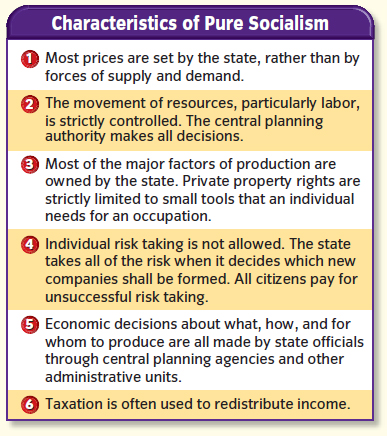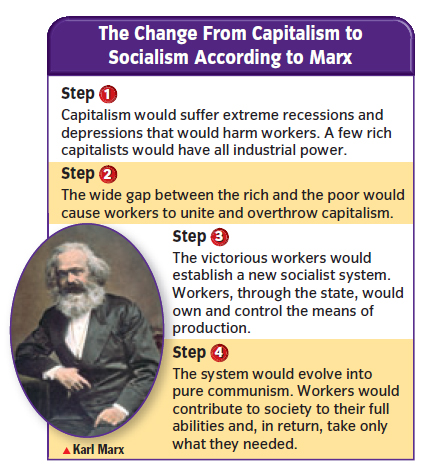Socialism and Capitalism
- Details
- Category: Economics
- Hits: 11,641
Some government intervention occurs in the American economy, but generally the marketplace answers the three basic economic questions of what, how, and for whom goods and services should be produced. In command (controlled) economies, however, the government (and not the market) answers these three basic questions. Read on to learn about the major alternative to market capitalism
Pure Socialism
Pure socialism is characterized by centralized economic planning and state ownership of the factors of production .
Economics & You Have you or a family member ever been treated unfairly in a job? Do you think that workers in general receive fair treatment under the American capitalist system? Read on to learn about socialism, the major alternative to free-enterprise systems.
Pure command socialism is an economic system in which there is little private property and the state owns virtually all the factors of production, such as big factories. In a socialist economic system, the government attempts to manage production and especially the distribution of goods. Few examples of pure command socialism exist. Perhaps the most extensively controlled economies today are in North Korea and Cuba. See Figure 2.4 below for a list of the characteristics of pure socialism.
The Marxian View of Socialism
Socialism as a modern economic system grew out of protests against the problems caused by the Industrial Revolution of the 1800s. Karl Marxviewed history as a continual struggle between various groups, or classes, in society. In his own day, he saw this struggle as going on between capitalists—owners of the land, machines, and factories—and the proletariat, or workers.

Figure 2.4 Pure Socialism
Socialism can be defined as an economic system that stresses government ownership of the major factors of production and control of the distribution of goods.
Marx believed that capitalists exploited the proletariat, or used them unfairly. According to Marx, the value of goods depends only on how much labor is used in producing them. He believed that when capitalists sold a good and kept the profit, they were taking income that rightly belonged to the proletariat, the people who were actually doing the work.

Despite capitalism’s dominance in the nineteenth century, Marx believed that it was ultimately doomed to fail. He outlined the eventual collapse of capitalism and predicted the evolution of socialism into communism—an idealized system with no need for a government. Today communism has come to mean any authoritarian socialist system that supports revolution as a means to overthrow capitalism and bring about socialist goals. Ironically, instead of “no government,” communist systems have historically demonstrated that a central government ends up controlling the entire economy. The proletariat, whom Marx envisioned owning and controlling the means of production, actually end up with little to no power at all.
Socialism Since Marx
In the twentieth century, socialism split into two major trends: democratic socialism and authoritarian socialism. Democratic socialism is a type of socialist system that works within the constitutional framework of a nation to elect socialists to office. In democratic socialist nations, government usually controls only some areas of the economy.
Authoritarian socialism , in contrast, more closely follows Marx’s beliefs. Its supporters advocate revolution as the means to overthrow capitalism and bring about socialist goals. In authoritarian socialist nations, a central government controls the entire economy. Communism, the term Marx applied to his ideal society, came to mean any authoritarian socialist system. Few countries today have such a system.
The Benefits of Capitalism
The main benefits of capitalism are economic efficiency and individual freedom.
Economics & You Which do you value more: personal freedom and individuality, or fairness and equality for all? Why? Read on to learn the values of a capitalist system.
Many economists like to compare the advantages and disadvantages of capitalism and socialism. Often such comparisons are based on individual values.
Supporters of Capitalism
Those who place a high value on personal freedom, initiative, and individuality prefer capitalism. They point out that socialism often brings extensive government intervention in all parts of the economy and, by necessity, in people’s personal lives.
Supporters of capitalism point out that capitalism allows for more efficiency in the marketplace and for greater rates of economic growth. Indeed, considerable evidence shows that unregulated economic systems—those that are closer to pure capitalism—have much higher rates of economic growth.
All Economies Are Planned
It is often said that pure socialism requires centralized planning, and pure capitalism does not. In reality, all economies are planned in one way or another, (Planning is unavoidable, no matter what the economic system. The United States has a highly planned economy. The difference between economic planning in the United States and in command economies is who does the planning.)
The United States has a highly planned economy. The difference between economic planning here versus that in socialist countries is who does the planning. Private firms, individuals, and elected government officials do the planning in the American economy. In pure socialist systems, central planners make decisions on behalf of everyone.
Real-world capitalism has some problems. Critics note that income is unequally distributed throughout the economy. They also say that although capitalist nations generally have enough government-provided goods such as highways, they do not have enough schools and museums for the general public. Such critics value some of the political goals of socialism.
- socialism: a system in which the government owns the major factors of production and attempts to manage output and the distribution of goods
- proletariat: term Karl Marx used to refer to workers
- communism: term used by Karl Marx for his idealized society in which no government is necessary
- democratic socialism: system that works within the constitutional framework of a nation to elect socialists to office; the government usually controls only some areas of the economy
- authoritarian socialism: system that supports revolution as a means to overthrow capitalism and bring about socialist goals; the entire economy is controlled by a central government; also called communism